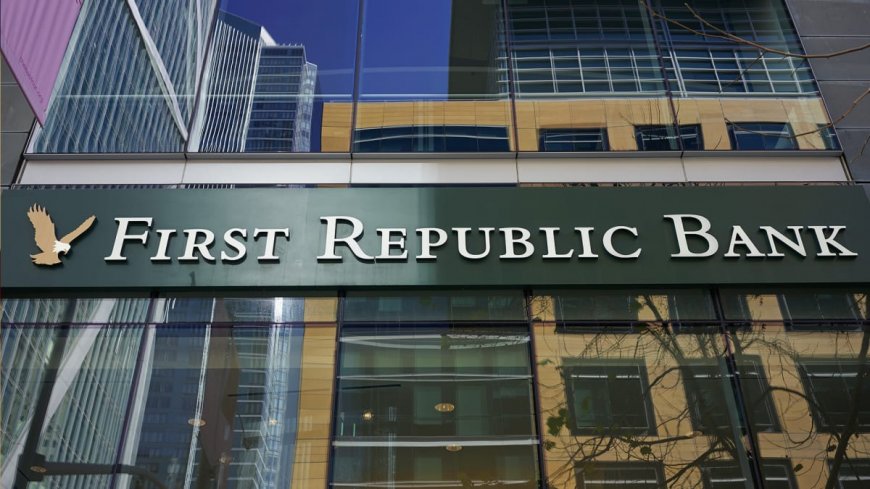'Big Short' Burry Gambled Big on Troubled Bank. The Bet Went Wrong
The legendary investor bet on First Republic Bank in the first quarter. In late April the firm was seized by regulators and on May 1 was sold to JPMorgan Chase.

For retail investors he is one of the most astute financiers.
They watch each of his messages on social networks in hopes of obtaining keys to investments.
Michael Burry in 15 years has become one of the most listened-to financiers on Wall Street. The 2008 financial crisis made him a legend and an example to follow in defiance of standard practices in finance.
The 2015 film "The Big Short" describes how the hedge-fund manager, who had no particular expertise in finance and real estate, came to understand that the sector had become a sandcastle. Financiers and bankers had created exotic mortgage products issued to financially fragile households and borrowers with poor credit.
Burry decided to bet that the subprime-mortgage market would collapse -- hence the name "Big Short." (Short sales on securities are bets on price declines.)
History proved him right and the move made Burry something of a Wall Street oracle. He embraced this role, judging by his Twitter handle, which is Cassandra B.C. For traders and risk-takers, he is a kind of party spoiler.
It is therefore quite logical that in March eyes turned to him when the current crisis of banking confidence started with a bank run on Silicon Valley Bank (SIVB) - Get Free Report.
The Santa Clara, Calif., bank played a central role in the economy and startups. It had to close due to a bank run caused by its announcement that it would raise $2.25 billion to cover a net loss of $1.8 billion related to the sale of bonds and other securities in its portfolio.
Burry Makes Huge Gamble on First Republic Bank
Since then, fears have spread throughout the banking sector, with investors fearing contagion. SVB failed on March 10, followed two days later by Signature Bank in New York (SBNY) - Get Free Report.
After warning that another major bank was going to collapse, Burry changed his mind. The founder of Scion Asset Management said that the current crisis did not present any real danger and could be resolved very quickly.
"This crisis could resolve very quickly," the famous investor posted on Twitter on Mar. 14. "I am not seeing true danger here."
Consistent with his bullish statements on the banking sector, Burry bet on the banks, anticipating their stock market rebound after the panic subsides.
He held 850,000 shares of New York Community Bank worth $7.68 million as of Mar. 31, and 184,900 shares of Huntington Bancshares, valued at $2.07 million, according to regulatory filings.
He also acquired 250,000 PacWest shares, valued at $2.4 million and 125,000 shares of Western Alliance Bancorp, valued at $4.44 million as of Mar. 31. Finally, he bought 125,000 Wells Fargo shares, valued at $4.67 million and 75,000 Capital One shares, worth $7.2 million.
Most striking, however, is that the iconic investor bet on First Republic Bank. He bought 150,000 shares of the San Francisco-based bank, valued at $2.1 million as of March 31. The problem is that First Republic Bank was seized by the Federal Deposit Insurance Corp. at the end of April and was sold to JPMorgan Chase on May 1. This transaction wiped out FRC shareholders.
Whether Burry still held shares in First Republic Bank when the bank was sold off to JPMorgan Chase is unclear. Perhaps he had sold his shares before May 1. But if he kept them in line with his mid-March optimism on the banks, he got a very bad deal.
The other question this transaction raises is what Burry saw in First Republic Bank to persuade him to gamble on a bank rebound when most investors had opted for caution.
Why First Republic Bank Failed
At the time of its failure, which was the second largest bank failure in U.S. history after Washington Mutual in 2008, First Republic Bank had seen its stock plummet more than 90% since SVB collapsed.
First Republic stock went from $121.89 on Dec.30, 2022 to $3.51 on April 28, 2023, the last trading session before the company was sold to JPMorgan.
First Republic Bank, which was founded in 1985 by Jim Herbert, has been a victim of its business model, which consisted of collecting large deposits from rich clients and paying little or no interest on them.
The bank, in turn, offered low-interest mortgages to those very some customers along with personalized service. The strategy worked for a very long time.
The firm had more than $200 billion in assets at the end of 2022, compared to $88 billion in assets at the end of 2017, which made it the U.S.'s 14th-largest lender.
But when the Federal Reserve began raising interest rates to fight stubborn inflation, this business model showed its limits. Customers began to panic and rushed to withdraw their funds.
What also fueled the panic is that the FDIC guarantees deposits up to a maximum $250,000. All individuals with more than $250,000 in their accounts would lose anything above the FDIC threshold if the bank defaulted.
First Republic Bank came up with a turnaround plan but the 41% drop in deposits in the first quarter ended up scaring investors away and signaling the end of the California bank as an independent entity.
What's Your Reaction?



























































